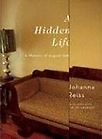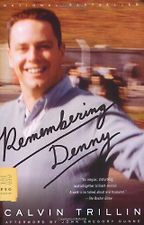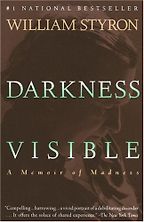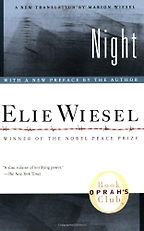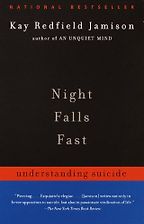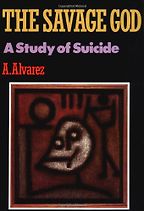Your first book is by Calvin Trillin, Remembering Denny. Why did you choose that?
I had heard that it was about the suicide of somebody who had gone to Yale, called Denny. And Jim, my late husband, had also gone to Yale and committed suicide. And when I read it, I was totally struck by the similarities: both these promising, academically incredibly accomplished men.
Jim had a Fulbright, Denny was a Rhodes scholar. Jim did not really drink, other than a glass of wine once or twice a week. Apparently Denny did drink. Denny apparently was homosexual, and didn’t want anybody to know. I don’t believe Jim was. So not everything was the same. And yet I was struck by the similarities. Denny’s class thought that someday he might be president; students in Jim’s school also thought he had that kind of potential. Somehow the expectations were so very, very high – the expectations others had of them, the expectations they must have had of themselves. They were both these very promising men, these perfectionists, who came to think of themselves as failures.
“I have a feeling that maybe for sons it’s even more important not to lose your Mum than it is for a daughter.”
I imagine that Jim must have thought of himself as a failure. I remember he came home from work once, he worked for a big retail company, and was telling me that not he, but this man whom he thought of as a fool has been promoted. The other guy I guess knew either how to network or had street smarts or whatever it takes to get ahead in the world, I don’t know. Jim did not have that. He was a very gentle soul who did not, I don’t think, know how to maneuver out in the business world.
Your book, A Hidden Life (2009), is about Jim and his suicide. Given how he loved books and history—when he proposed to you, he did so by talking about the great love between Queen Victoria and Albert, you barely knew what he was talking about it was all so lofty—why was he working for a retail company? Why didn’t he become a writer or a journalist?
During the war he’d been in the army. His job had involved putting a control system (or something like that) in place. And he did such a good job that his superior said to him: ‘You could have a bright future in business.’ And because Jim’s father had been a totally absent figure, this superior in the army became a sort of father figure to him. So when this man told him ‘business is going to be your area – you’ll do very well,’ it had a big influence. I think that’s probably the reason, because Jim had a full scholarship to Yale Law School waiting for him – and he never took it up .
“Somehow the expectations were so very, very high – the expectations others had of them, the expectations they must have had of themselves. They were both these very promising men, these perfectionists, who came to think of themselves as failures.”
Instead he went to Harvard Business School, where he did not have a scholarship. We spent years paying for that miserable education. I say miserable not because I mean to insult Harvard, but because I never thought it did Jim much good and I have a feeling that it wasn’t really his métier, although I’m sure he was very, very good at what he did. But I always had the feeling that he somehow chose the wrong path.
And couldn’t change it?
No. We had two small children. I was not able to bring in any money really, ten dollars here, 20 dollars there. We had no money. And his mother, we helped support his mother too financially. So we really had no money. At some level he was stuck. Or must have felt that he was stuck.
So did Denny and Jim have anything else in common?
In Denny’s life there was something traumatic that happened to him when he was a kid. I think his mother died, or his mother left him, I forget. But I know in Jim’s life, he went to live with his mother when he was a teenager and his mother was, to put it mildly, mentally unstable. And I can’t imagine she was that much of a mother to him. It was more that she needed a caretaker than that she able to take care of him. Which is interesting because in William Styron’s book, which is another one of my choices – in his book as well, something happened to William Styron. When he was 13, his mother died and it was very traumatic for him. And I have a feeling that maybe for sons it’s even more important not to lose your Mum than it is for a daughter. I don’t know but I’m sure it is terribly traumatic for a kid to lose a parent.
Get the weekly Five Books newsletter
The other interesting similarity between Denny and Jim is that apparently friends mentioned afterwards that Denny seemed to be very withdrawn. And I had the same thing. When I began to write A Hidden Life, I called everyone that I could get hold of that had known Jim, and they said he had become very quiet and very withdrawn. So each of them, Denny, Jim, was perhaps already in his own, closed, box.
So you mentioned William Styron’s book, Darkness Visible. He is of course the author of Sophie’s Choice, but in his 60’s he came to suffer this terrible, terrible depression, and that’s what this book is about.
Yes, the subtitle of the book is A Memoir of Madness, because he equates suicide with madness. He drank. William Styron drank. Jim did not. And Styron became aware how depressed he was when he was on his way to Paris to accept a big award. He actually began to really go downhill after he stopped drinking. Styron was so terribly depressed, he could hardly get out of bed anymore. Jim never displayed anything like that at all. He went to work and behaved as if everything was completely normal. And at the end of Styron’s book, he is just about ready to kill himself, and he listens to Brahms’ Alto Rhapsody. And the voice of the alto makes him realize that his mother used to sing that piece to him when he was small. And it was then that he really broke down. He broke down, but in a good way. He woke up his wife, they made phone calls and the next morning he was in hospital. And that saved him.
“He actually began to really go downhill after he stopped drinking.”
What strikes me is that in many cases if people had been able to ask for help, or if they had been aware how much they needed help, their suicides could have been prevented. Almost every one of these books says that suicides can be prevented. I don’t know if Jim realized it, that he needed help. I just don’t know. I certainly didn’t know. In Jim’s case – it was 40 years ago, and truly there was a lot of stigma attached to going to ask for help.
I think things have changed a lot in that regard.
And yet the suicide rate remains high. I read in the Jamison book, Night Falls Fast, that 30,000 Americans die each year by their own hand. Someone commits suicide every 17 minutes in this country. And I googled it the other day to see if that was still the case and the rate has not diminished. And then there’s half a million other people who try to kill themselves, but only end up in the emergency room.
In A Hidden Life, it seems you had no inkling that something was wrong. Jim certainly never turned to you and said: “I feel so depressed.”
Never. I was not aware of anything. Nothing. He had moods. But who doesn’t have moods? One day he’d come home and work had been great and another day he’d come home and he’d say this fool has been promoted, how come? So his moods went up and down, seemingly only having to do with work. But it seemed so normal, that people should have ups or downs because they’ve had a lousy day or a great day. No, I absolutely did not know.
And I guess towards the end, when people are about to commit suicide and have really begun to contemplate the details – when they’re going to do it, where etc. – I think at that point they may not be very reachable anymore.
So in Styron’s case a piece of music helped save his life. Tell me about the piece of music you have selected.
I’ve chosen Johan Sebastian Bach’s The Well Tempered Clavier, Book I, no. 1. It’s my favorite. Every day, as I was writing A Hidden Life, I treated myself. I’d start working at 8.30-9 in the morning, and by eleven o’clock I was totally worn out emotionally. And then I’d put this piece of music on. And I would become so serene, that I was able to work for another half hour or so.
I just love it. It is so simple and it is so very sensitive, it goes right into me, it probes right through my outer shell. I can’t imagine anybody could resist this kind of music.
Music, to me, is such a great a healer. I can even enjoy the beat, the energy, of rap music. The words are a bit repetitive maybe, and not always very pleasant. But Bach, Mozart, they give me a feeling of completeness.
So tell me a bit about Elie Wiesel’s Night. He was a Romanian-born Jew, and as a young boy ended up in a concentration camp and saw the most horrifying things.
I chose Night because I wanted to see how concentration camp inmates fared under those horrible circumstances. You know, when I began to write A Hidden Life, which was about 14 years ago, I did a lot of research because I wanted to make sure that I could stand behind what I wrote. And I managed to track down the policeman who had been called to the house after Jim’s body was found. This was nearly 30 years after it happened. And he came here and we had a coffee and he said it was interesting for him to meet me, because he almost never meets the widow or the widower. And he said something that I also read in all these books that I’ve recommended – that the middle class and the upper class are much more likely to commit suicide than those who have to find their daily bread, so to speak. So Elie Wiesel’s book. I had read it many years ago, but I reread it. In concentration camps, the biggest goal for most of them was to get the next crust of bread. And they were already being punished by the Nazis and so they didn’t think they had to punish themselves too. And so there were very few suicides in concentration camps, which is strange when you think about it, it surely seems like a place you’d want to get away from.
And the other thing about suicide is that if you feel that somebody totally needs you, you manage to hang in there. There has to be a reason for people to stay alive, there has to be hope, and there has to be somebody or something that is so important that you couldn’t possibly leave it. Elie Wiesel wrote–he was a boy in a camp–that he was considering running into the barbed wire once, but he didn’t because his father needed him. And that’s the only time he mentions the allure of suicide.
“There were very few suicides in concentration camps, which is strange when you think about it, it surely seems like a place you’d want to get away from.”
And that’s why I feel bad. My kids and myself were left – were we not important enough to Jim? But maybe that’s an ignorant sort of question because who knows? You just don’t know. I’ve never been in that position, of feeling suicidal, so I do not know. I used to think that maybe it took courage to kill yourself. Personally I am more afraid of death than of life.
So tell me about the Jamison book, Night Falls Fast.
This is really more like a textbook, but it says some important things. She tried to commit suicide herself when she was 28. She is very big on scientific research, and talks about lithium, for example. Styron talks about this too, he says that the use of lithium to stabilize mood swings in manic depression is a great medical achievement – but that he was already too far gone for that. He had to be put on some tranquilizers that made him sick as a dog.
Jamison talks about understanding suicide as a response to an unendurable level of mental pain. Frankly that’s what all these books have in common. I don’t want to say that once you’ve seen one suicide you’ve seen them all. But all those who tried to commit suicide, they do it because it seems to be the only reasonable – irrational as it might be – solution to get rid of the terrible mental anguish. So when people leave suicide notes, they tend to say things like ‘I couldn’t bear the pain any longer.’
Five Books interviews are expensive to produce. If you're enjoying this interview, please support us by donating a small amount.
Actually Jamison says very few people leave suicide notes, only about one in four. Jim left no note. Apparently that is very typical, often there is no note.
It’s a very vivid image in your book, you searching and searching for the note. Why were you so sure Jim had left you one?
Because he was so dependable and so responsible. He was so responsible that hours before he died he took the sick cat to the vet. That was the last check that he ever wrote. Who would think of taking a cat with a droopy eye to the vet?. He was always extremely thoughtful, very protective. So I couldn’t imagine that he had just left without at least telling me that he had some horrible illness.
“Jamison says very few people leave suicide notes, only about one in four. Jim left no note.”
I had hoped to find something that would tell me why he had done it. Of course it might not necessarily have helped. He might have said something in there, referred to some problem that I had been aware of while he was alive, but had done nothing about. As I say in my book, maybe it’s just as well there was no note. His words might have made me even more upset than my own thoughts were already making me. I don’t know, I guess you try to justify everything. Believe me I looked everywhere for it.
I wonder why people don’t normally leave a note.
Who knows? Perhaps if you start writing a note it’s already too distracting, you’ve put half a leg back in the land of the living and that might potentially stop you from going about your suicide plans. I don’t know. Often the notes will say, to the ones who are left behind, ‘I love you, this has nothing to do with you.’ But I happen to personally know a husband and wife in Amsterdam whose oldest son, a doctor, killed himself, and he left a note blaming his parents, which is a terrible thing to have done because it was his choice and his decision.
One of the things in your book that I found most shocking is when you fly back to New York alone after getting the phone call telling you that Jim has killed himself. You are still convinced that it couldn’t possibly be suicide, that he must have had a heart attack, that there must be some mistake. And one of the policemen says no, it’s a classic case. This was very well planned, to coincide with when you and your daughters were away.
I think as Sylvia Plath once said, once you decide to commit suicide, you become extremely clever at figuring out and disguising what you mean to do. Yes, Jim must have been planning this – how did I know? And maybe in the last few days when he was in Holland before he went back to New York, he did act very weirdly.
You’re talking about the incident in an Amsterdam hotel, supposedly a romantic night away together, that you describe in your book.
Yes, it was weird, I had never seen him like that. I had no idea what to do with it. But I knew that it scared me. I didn’t tell anyone about it, not even him, because it was so terrifying to me. You know the other thing is that as an immigrant, I was totally in awe of his education. We met on a blind date and I had been told by the girl who introduced us that he had been to an Ivy League school. I pictured some ivy on a wall and that’s all it meant to me. Yale meant nothing to me; I’d never heard of Harvard either. He talked about the history of Boston, and mentioned Paul Revere, to me it was just a brand of pan. I had no idea. And he must have liked that at some level. I think he was charmed by it.
If he felt all the weight of that expectation, it must have been wonderful to be with someone for whom it was all irrelevant.
Irrelevant, yes, and it made him laugh. But I think somewhere he also liked the idea of this jeune fille who needed to be educated. He always told me I was as smart as he was but that I hadn’t had the schooling. It may have given him a real boost to educate me. And in retrospect I think that had I been rather more forceful,or more persistent, I might perhaps have been able to get him to go for help. I don’t know. But I was almost embarrassed noticing that he was so weird, as though a mentor, a teacher, shouldn’t behave in that way. And what do you do when he does? What he had found so charming for years, my naiveté, probably ended up being something that wasn’t that useful for him.
Why do you think he wanted you to write a book? Had you done much writing at that point?
No, I never wrote anything longer than a shopping list. No, he had no idea. I think maybe – who knows – he’s not here to tell me ‘no you’re totally wrong.’ But maybe, since he didn’t have the chance to become a writer because he needed to make money (you’ll notice I don’t equate the two) he said he was going to help me. Maybe together we would have made a beautiful The Upstairs Room. But then he didn’t come through for me. He left me before I had even gotten to finishing the first draft. But I learned a great deal from him, he was a tremendous teacher. I learned more from him than I ever learned in school, which I didn’t get to go to for long.
So your last book, by English poet Al Alvarez.
Yes, The Savage God. It came out in the 1970s and I’ve had for many years. He begins the book by talking about Sylvia Plath, apparently she was a friend of his.
Yes, once you start thinking about it thematically, you realize that a lot of people have committed suicide.
A lot, and especially in the creative world: Sylvia Plath, Ernest Hemingway, van Gogh, Primo Levi. Just so many. Alvarez says a lot of interesting things. For example that many years ago, those who committed suicide were buried in the same area were criminals were buried. Because it was a sin. And I guess in some extreme cases of religion it probably is still a sin. Another thing that Alvarez says that struck me – and by the way he also tried to commit suicide – is that suicide is a messy business. But now scientific research is being done about it, it has become respectable, because everything that science touches becomes respectable.
He also argues that although suicide seems like the solution in the minds of those who do it, that actually it’s a form of failure, just as divorce is a failure, at some level. And I guess those who try to commit suicide and don’t succeed, when they come to, often they don’t even say it was suicide they were thinking about, because it is too embarrassing. Alvarez calls himself a failed suicide.
He also talks about things like the suicide cult. If the newspapers pay a lot of attention to suicide, there are those who want to imitate it. And he’s a poet so of course it’s quite literary. He talks about the Romantic poets, for whom dying young was glamorous. Also Shakespeare uses a lot of suicide in his plays. But I’m not that up on Shakespeare. It’s a language I never learned to appreciate because I never read it in Dutch and in English the language strikes me as very complicated. I never conquered Shakespeare – Jim tried, believe me.
Alvarez also says he doesn’t feel it is a disease, but a “terrible but utterly natural reaction to the strained, narrow, unnatural necessities we sometimes create for ourselves.”
But in Jim’s case I wonder.
What do you mean?
Well, that’s the other thing that I speculate about. And maybe it is totally based on the need to feel that Jim loved us. But when his mother was in a mental institution, he went to see her and it was a very unpleasant thing. I wonder whether he may have thought that he would end up the same way and that he wanted to spare our kids.
Get the weekly Five Books newsletter
Jim was very protective as a person, and I think maybe he wanted to protect the kids from having to see him like that. He felt enormous guilt when his mother died. Styron talks about suicide as a form of madness, and Jim’s mother was not mad, but certainly heading in that direction…So perhaps he felt himself heading in that direction and didn’t want our kids to have to go through what he had to go through with his mother.
You mention Jim’s guilt, this is a big theme in all these books. The guilt of those who die, the guilt of those left behind. But perhaps because of your wartime experiences you have a lot more perspective on life. I certainly don’t get the feeling that you feel guilty.
No, not anymore.
So it’s just because it’s been so long?
Yes but also because I had no time to. Maybe this is a bad thing. But as you know my mother died right at the beginning of the war. I was never able to mourn her because I had already gone into hiding by then. And those brave people who were risking their lives to save, hopefully, your life, didn’t want to see an unhappy face. I always tried to be as cheerful as possible while I was in hiding.
And I never really mourned Jim because I had to be strong for my daughters. That was the only thing on my mind – I have to get these kids through it. I have to bring them up, and I don’t want to be a miserable mother who wails and sits and weeps. So I never did.
I didn’t begin dealing with Jim’s suicide really until I began writing A Hidden Life, which is why it took me so long, because it was a very hard thing to do.
Five Books aims to keep its book recommendations and interviews up to date. If you are the interviewee and would like to update your choice of books (or even just what you say about them) please email us at [email protected]

